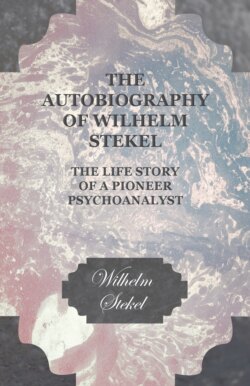Читать книгу The Autobiography of Wilhelm Stekel - The Life Story of a Pioneer Psychoanalyst - Wilhelm Stekel - Страница 18
На сайте Литреса книга снята с продажи.
BETWEEN MATERIALISM AND IDEALISM
ОглавлениеThe mixture of idealism and materialism was evident at this period of my life. While I had dreams of becoming a great poet, I tried to build my physical strength by exercise and continence. I spent all available free time at the gymnasium or on long hikes with my friends. I also set some of my own poems to music. At first, my friends laughed at my efforts. Later I was more clever and disguised my compositions as songs by Schubert—then the poems were enthusiastically applauded. Years later I heard one of my songs in a students’ fraternity; it had found its way to the public. Many students learned my songs, and the songs were passed on from person to person. They were accepted only when they were believed to be compositions by Schubert or Schumann.
Years passed. School was like play for me; in the afternoon I gave lessons, but I had enough time for reading and music. However, the day I left high school (Gymnasium) was one of the happiest of my life. The freedom which followed the restrictions of the school made me feel as though I were drunk with champagne. We, the happy ones, the higher beings, strutted back and forth along the promenade, canes in our hands, the latter a violation of one of the school’s strictest regulations. I longed to study the German language and the history of mankind, but the prospects of so doing were poor. Besides, I was eager to see Vienna. The University of Czernowitz had no medical faculty. The study of medicine offered a good reason for me to go to Vienna.
At the final examination everybody was asked to state what he was going to study. I answered, “German and history.” The good old principal, Wolf, called out, “You ought to become a journalist.” I had not thought of this career before, but I knew that since I had a definite talent in this direction, I could fall back upon it in an emergency.
Then came a joyful vacation time. The governor of the county, Baron W., invited me to stay with him on his estate. I had tutored his son, a fellow student, successfully and now I was to coach another son in Latin.
At Baron W.’s I learned about the lives of aristocrats from many angles. There was always an abundance of guests, and they did not think that the baron would have invited a Jew. Thus I had the opportunity to listen to many frank and unrestrained anti-Semitic talks. I was astounded. I had not realized that the Jew played such a part in the discussions of Gentiles. I felt sorry for these guests. Even then I realized that by blaming the Jew for all of their own failings and by projecting their own guilt feelings upon him, they were tragically depriving themselves of the opportunity for a radical improvement and spiritual progress.
1 “Analyse der Phobie eines fünfjährigen Knaben” (Analysis of a Phobia in a Five-year-old Boy), Coll. Papers, Vol. VIII, pp. 127-264 (German edition).
2 Macaulay Co., New York, 1931.
3 Bukovina is now in the U.S.S.R.—The Editor.
4 This experience, together with similar experiences of his friends, was later used as a basis for Stekel’s first medical paper on the Sex Life in Children. It was published independently of Freud who later quoted from it in one of his early works on infantile sexuality.—The Editor.
1 He was awarded the Nobel Prize for literature in 1949.—The Editor.
2 Notice that Stekel uses the term “parapath” which he proposed for “neurotic.”—The Editor.
